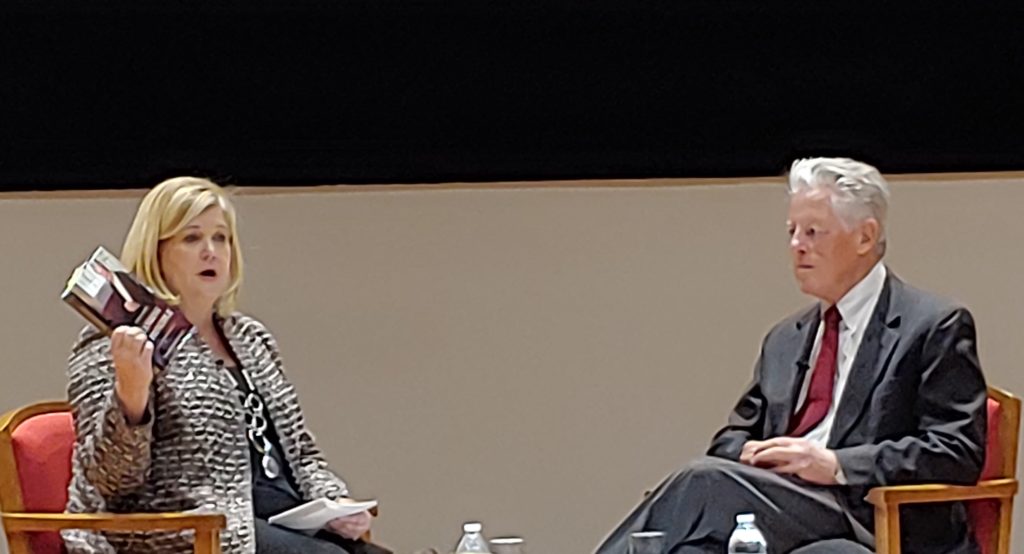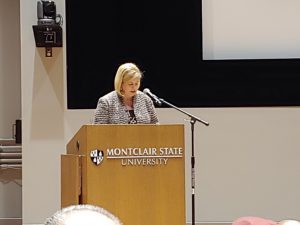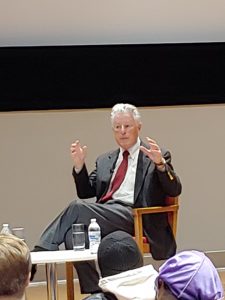Erichettian Maneuvers: Florio's 'Four Stages Of Political Development' And Other Lessons

At the second installment of Montclair State University's Salon Series, former Governor James Florio delved into a deep discussion with political science professor Dr. Brigid Harrison on his recently published book, 'Standing on Principal', and mused on the lessons he's learned throughout his career in public service - stretching back to the days of South Jersey political boss Angelo Erichetti.
In the book, Florio recounts anecdotes of how he observed Erichetti's political machinations and maneuvers, marveling at the boss' ability to utilize political information. He told the attendees how Erichetti would meet with someone, hear a piece of political information, and then meet with another person right after, and share the information as though he was the primary source. It was an effective utilization of political information as a way of wielding political power and influence, Florio said.
Erichetti, who ended up on the wrong end of an indictment during the Abscam scandal in the 1980s, was one of the state's most influential political bosses at the time, in addition to being a state Senator and Camden County Democratic Chairman. Florio remembered him as very intelligent, wily, a 'little thuggish, a little crude, but very smart'. Saying he learned a lot by simply sitting in his office as a young up-and-comer, Florio characterized Erichetti as being able to effectively manipulate people in a true Machiavellian fashion.
Despite Erichetti's political abilities, Florio knew that it wouldn't last. Erichetti was a good example of a politician who was smart but eventually fell prey to believing their own press clippings - hubris. Recounting an anecdote about the boss calling a police chief to order a stake-out of a political enemy, Florio remembered thinking 'this is not a longevity play'.
In the end, it wasn't - for Erichetti. The political boss got caught up in the Abscam scandal and was convicted in 1981 and went to jail, thus ending his political career. Meanwhile, former protege Florio's career was on the ascent. Serving in the Legislature and Congress in the '70s and 80's, he was elected Governor in 1989 and defeated in 1993 by Christine Todd Whitman.
Using himself as an example, Florio detailed the four stages of political development, according to his vantage point and experiences:
The first stage was the 'traditional old machine politician'. As a law student new to Camden and looking to break into politics in Camden, Florio was made a district leader, overseeing a political apparatus of 600 people. There was no real authority, he says, but it was perceived authority. He did the work of the traditional old machine - the door-to-door work, the retail politics in its purest form. That was coming to an end when we was breaking through, he says.
The second stage was the 'McGovern stage' beginning in 1968. The Democratic presidential candidate running against eventual GOP winner Richard Nixon, Florio says that McGovern re-made the Democratic Party. There was a primacy placed on political volunteerism, rather than paid political workers. There was a political appeal to people based on ideas and beliefs, rather than being paid to work. Then the Chairman of the Camden County Young Democrats, Florio says that was his 'coming of age' stage.
The final two stages deal with how modern campaigns are run: the third stage being the rise of high visibility consultants, such as Lee Atwater, James Carville, and Ed Rollins. These were the guys who began building campaigns and were given the reins of running day-to-day operations, in addition to the rising need to raise money to pay for political consultants who had livelihood stakes in the political campaign world. The fourth stage is the rise of 'low visibility' consultants - the behind-the-scenes data collection, the voter segmentation, and the micro-targeting that today are relied-on tools in even the most local of campaigns. That, too, leads to an even more astronomical costs, and an even greater need to raise money, says Florio.
Responding to Harrison's query on the differences between the political machines of yesterday - during the Erichetti Era - and those of today, Florio says they differ dramatically.
He recounted a story involving former Assemblyman David Friedland (you know, the one who faked his own death and went on the run) testifying in support of a bill, then went back to his desk, and promptly received a call from his county chairman, evidently irate at Friedland's support of the bill. The Assemblyman got back up, and said 'I gave you all the reasons why its a good bill. Now here are the reasons why it's a bad bill'.
The machine organizations of the past are 'nothing comparable to yesterday's' the former Governor says. Back then, there was influence, and coercion. Florio says that the party organizations now aren't dominated simply by people on the payroll. There's much more of a broad-based composition in the party structure, people affiliated with different groups and different views, as opposed to in the past, where people were dependent on the party organizations for their livelihoods. Now, county committee members have separate lives - and separate paychecks that aren't derived from their party position.
Florio learned several lessons from his own electoral successes - and electoral defeats. One, he says, is when there's a landslide election, its best to be on the right side of it. In 1972, the year of Richard Nixon's landslide victory over McGovern, then-Assemblyman Florio lost by a small margin (5%) in a bid for the CD1 seat. That night, as he drove home with his three children, his daughter began to cry over the defeat. He told her not to cry - that when you lose, it's important to 'learn, correct, and come back'. Two years later, Florio ran again and he won. 'All your experiences leave you something,' says Florio. 'Pain can give you understanding'.
And, you can learn as much from losing as from winning.
[caption id="attachment_42823" align="alignleft" width="300"] Dr. Brigid Harrison at the podium[/caption]
Dr. Brigid Harrison at the podium[/caption]
The former Governor believes that the role of a leader requires an ability - and a responsibility - to be able to tie together the various interests that on the surface may seem to at odds with each other. People are inherently good, and will vote for the public interest, but will also their self interest, he says. The role of leader is to show people that their self interest is the public interest - that the collective self-interest and the public interest are one and the same. Using an example, he says that a gas tax may be perceived by a voter as against their self-interest, but crumbling bridges and decrepit infrastructure is also against one's own self-interest, and the public interest. The disconnect from that realization - that the self-interest and public-interest are intertwined - is a root cause of poor leadership. Florio takes a critical view of those who look at politics as an opportunity to foment division among people, as opposed to those who view politics - and government - as an opportunity to strengthen the public interest. 'There are people with motivations who aren't as high as they could be', says Florio.
'We've adopted into our psyches the Reagan mantra of 'government isn't the solution, government is the problem', he says. 'Its not inherently good or bad. Its a tool, and can do good things' if its in the right hands, and if its honest.
'Nothing is for nothing', Florio continues, adding that when he was Governor, 'we had to do unpopular things. We cut, but we had to raise money'. As Governor, he says he inherited a $600M budget deficit right off the bat, with an even larger deficit heading into the following fiscal year. Discussing the sales tax expansion (and the 'toilet paper tax', as commonly referred to in Jersey political vernacular), he recounted how it generated pockets of resistance. The moral of the story, he says, is if you feel strongly about something, and when you're in a leadership role, you have to make the hard decisions. He held town halls as Governor, as says that when he was able to explain his position, he was able to at least get people to a rational point and able to connect the notion of the public interest to their own self interest. 'The craziness of the time was that everyone felt they were oppressed' by the tax increase, but in the end, Florio believes it was the right thing to do. He notes that he was the last Governor to make pension payments - his successors stopped, and the state now faces a $60B unfunded liability.
Discussing the 2000 Democratic primary campaign, where Jon Corzine spent $35M while he spent $2.5M, Florio notes that eventual victor Corzine operated in a 'unique' and 'clever' way - he secured the support of the county party organizations through contributions. Not knocking Corzine ('he's a friend', Florio caveats), Florio acknowledges that Corzine focused not just on media buys or direct voter contact, typical of any campaign, but focused with a 'fairly transactional openness' in financing the party organizations. Now, he says, no candidate with money in New Jersey spends it just on media, he notes. They go right to the organizations. Corzine pioneered it. That was part of Murphy's strategy for victory in 2017, as well. Earlier this year, GOP Senate candidate Bob Hugin gave over $750k to the Republican county organizations, maxing out to each of them.
An audience member asked him his take on rising media scrutiny of the personal lives of candidates, and what his thoughts are on the matter. Florio says that while the media has clearly become more intrusive, if there's a choice between a lack of scrutiny or not being intrusive enough, he'll take the latter.
Another asks him to compare the role that bipartisanship plays in governing, based on his experiences as a legislator in the 1970s and 1980s, and what he sees today. Back in the day, there was no problem
[caption id="attachment_42825" align="alignright" width="225"] Florio[/caption]
Florio[/caption]
working across the aisle, and he recounts how he partnered often with former GOP Rep. Ed Madigan on various bills. 'Start off with where you agree', he advises, then you can discuss the things on which you disagree. The 'whole democratic process is about forming consensus from divergent views', Florio says, adding that 'the polarization, while understandable, is not good. The 'safety valve' that stops things from getting out-of-hand is the idea of 'upward mobility' - the American Dream. That, in Florio's perspective, is what the country is all about.
He adds that 'we need intellectual courage. The courage to question conventional wisdom, and the status quo, and the ways thing are being done'. He also says that the law needs to take the transformational changes that society experiences more often into account. 'We're applying old policies to new problems', he says, and those changes must be addressed.
He advises the audience, many of them Montclair University students, to 'listen a lot, and read a lot' and 'don't rely on just once source or one view' to shape your worldview. Take it all into account, process it, and arrive at your conclusions, while being open to different modes of understanding and thinking.
One attended posed a blunt question to Florio, the man who worked his way up the political machine and through the ranks of public life to ascend to the Governorship. Through it all, does he regret having run for public office?
The answer was no.





